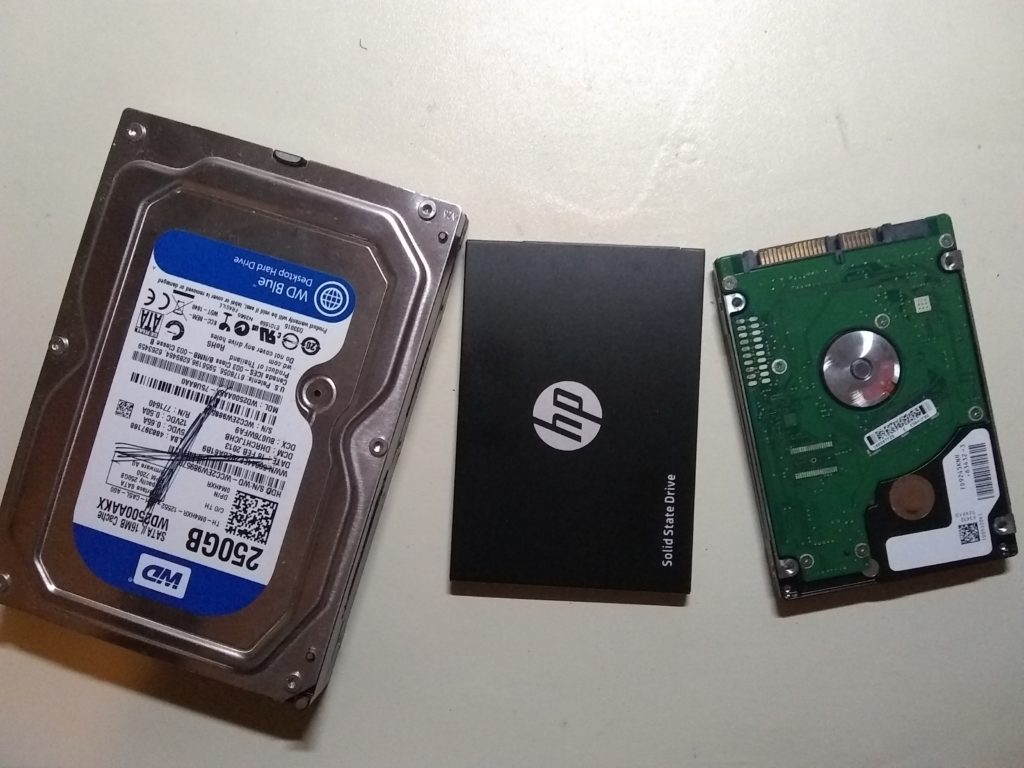
Today we’re breaking down the definitions and comparisons between HDDs and SSDs. For those who are unfamiliar with Computer hard drives in general, a Computer’s Hard Drive is the part that’s responsible for storing all the data you save. Everything from your Word, Excel Documents, to pictures, music, movies, audio files, etc.

Keep in mind that the Memory, also called RAM (Random Access Memory) is different from the Hard drive. The memory is the part of your computer that keeps track of all running applications while you are working on your computer. For example, browser tabs, and other open apps like adobe, antivirus programs, and so on. I just wanted to clear that up because it’s easy to get the two confused and people say memory when referring to the hard drive in all the time which can be very confusing.
Back to our initial comparison, HDDs (Hard Disk Drive) Vs SSDs (Solid State Drive) – can be both generalized as hard drives since they perform the same function, but SSDs are advanced and offer more advantages compared to HDDs and here are the main advantages you can get from a Solid State Drive when comparing the two:

Please note that the ideas in this comparison list were referenced from the following source: https://www.diffen.com/difference/HDD_vs_SSD
Speed
The SSD when compared to an HDD is faster because an SSD has faster read/write speeds, is able to handle more input/output operations per second (IOPs) and has lower latency than a regular hard drive. Latency is the period of delay were the hard drive waits for another component to execute a given task.
Weight
HDDs in general are heavier than SSDs because they all have mechanical parts in them that include spinning disks and spindles. An SSD on the other hand, has no moving parts. You can think of an SSD as sort of a giant version of a USB flash drive. They mainly contain memory chips inside which makes them so much faster.
Power Consumption and Vibration
Hard Disk Drives require more electricity to power those spinning disks inside them and spin them around which also cause them to vibrate while Solid States have no such parts, therefore they require little power and do not generate any sort of vibration or noise.
If you happen to have an external HDD, next time you use it, place a finger or two on it very lightly and you’ll notice a light vibration when it’s powered on – which indicates that the disks inside are spinning. Now try that with a Solid State if you have one and you’ll notice that there’s no such vibration or heat being generated from it.
Another thing you’ll notice from the vibration of a spinning Hard Disk is the noise it generates, especially from one that is starting to go bad.

Other Comparisons:
As you can guess, the price of SSDs are higher than that of HDDs especially when comparing the size of storage. But they’re still cheap compared to what they used to cost when they first came out. You can get a decent size SSD (about 250GB) that’s enough to boot up your Operating System and hold a few of your files. If you require more storage, you can always get an external Hard Drive which you can carry around and hook up to any computer you are working on.


I have read so many posts about the blogger lovers except this
article is actually a pleasant post, keep it up.
Awesome .. I’ll bookmark your blog and take the feeds moreover?
very same niche as yours and my users would truly benefit from a lot of the information you present here.
Best view i have ever seen !
Very descriptive blog, I enjoyed that bit. Will there be a part 2?
Way cool! Some extremely valid points! I appreciate you penning this post and
the rest of the site is really good.
Here is my homepage … CBD for sale
Like!! Great article post.Really thank you! Really Cool.
I couldn’t resist commenting
Greetings I am so happy I found your webpage, I really found you by mistake, while I was browsing on Digg for something else, Regardless I am here now and would just like to say kudos for a remarkable post and a all round entertaining blog (I also love the theme/design), I don’t have time to browse it all at the minute but I have bookmarked it and also included your RSS feeds, so when I have time I will be back to read a lot more, Please do keep up the excellent work.